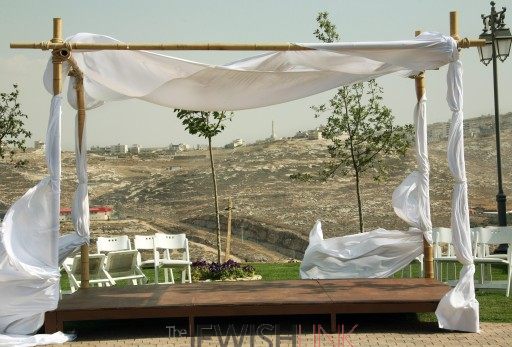
Israel – The so-called “Tzohar law” to abolish regional marriage registration districts was passed into law Monday evening ending a long running feud between the Tzohar national religious rabbinical association and the religious establishment.
The new legislation, which passed its second and third readings in the Knesset plenum Monday night, will allow couples to open a marriage registration file with the local rabbinate of any district or city they wish regardless of where they themselves reside. Until now, registration had to be conducted in the municipal jurisdiction of one the spouses of an engaged couple, limiting their options in choosing a professionally run rabbinate and even the rabbi they would like to marry them.
A feisty debate preceded the passage of the bill, with MK Moshe Gafni of United Torah Judaism accusing Deputy Minister of Religious Services MK Eli Ben Dahan of not caring about the Torah, and alleging that the bill would make the marriage registration process unreliable.
“You have disengaged from the Torah of Israel and you will be responsible when there is a disengagement from Judea and Samaria,” shouted Gafni from the Knesset podium.
Ben Dahan answered angrily saying that religious commitment was not only the preserve of Gafni and his colleagues in the haredi parties, and that a computerized data base containing marital status records that is now operative would ensure the reliability of the new system.
“You aren’t the ones to teach us religious dedication, and I say this with full humility,” said the Deputy Minister fiercely.
Tzohar described the passage of the law as the “completion of a revolution in the process of marriage registration,” which would put out of work marriage registrars who don’t act in an appropriate manner.
The organization has argued that the regional marriage registration districts perpetuate an inefficient, hostile, and obstructionist system, and alienates secular Israelis from religion and the religious establishment.
The law was also promoted by Tzohar because it alleged that the 600 rabbis belonging to its rabbinical association were prevented by the Chief Rabbinate and the Religious Services Ministry, formerly run by Shas, from gaining licenses to perform marriages.
The organization claimed that this stance was motivated by a desire within the religious establishment to protect weddings as a source of income for chief rabbinate approved rabbis who, Tzohar alleges, frequently and illegally charge couples for performing weddings.
The chief rabbinate has strongly denied this charge, but has continued to oppose the bill. In August, shortly after the election of new chief rabbis David Lau and Yitzhak Yosef, the Council of the Chief Rabbinate again publicly voiced opposition to the bill.
The basis for the rabbinate’s opposition, as well as that of the Haredi parties Shas and United Torah Judaism, is the claim that the legislation will make the marriage registration process less reliable and lead to the inadvertent marriage of people who cannot marry according to Jewish law. Chief Rabbi Lau and the council have argued that municipal rabbis are better able to investigate the marital-status history of someone seeking to open a marriage file when the registration process is carried out in the district in which at least one of the spouses resides.
Proponents of the bill have countered that a computer data base containing comprehensive information on citizens’ marital status that has recently been established by the religious services ministry circumvents such a problem.
In addition, four senior rabbis from the conservative wing of the national religious movement called on the four Tekuma MKs who are part of the Bayit Yehudi faction to oppose the bill.
However, the so-called Tekuma rabbis were principally complaining about the fact that they had not been consulted on the law by the party.
In the final vote, eleven of Bayit Yehudi’s 12 MKs voted in favour of the bill. MK Orit Struck of the faction’s Tekuma party was absent.
The bill passed by 57 votes to 14 with one abstention.
Tensions between Tzohar and the chief rabbinate and Ministry of Religious Services came to a head in August 2011, when then-religious services minister and Shas MK Ya’acov Margi imposed a strict limit on the number of registrations that could be conducted in the Tzohar- friendly marriage registration districts, thereby de-facto severely limiting the number of people who could take advantage of Tzohar’s wedding service.
Tzohar shut down it’s wedding service temporarily in protest, promoting outrage at the rabbinate and ministry from broad swathes of the political spectrum. Margi eventually backed down and an administrative solution was worked out which has been if place ever since. But Tzohar decided to seek legislative security for its flagship program to guarantee its ability to continue operating in the future.
Tzohar initially set up its free wedding service as a way of easing the bureaucratic process for couples, especially from they non-religious sector who are unfamiliar with the complex and often times unwelcoming religious bureaucracy.
It has performed 80,000 weddings since it’s program was established in 1995, including 4,000 in 2012.
Tzohar chairman Rabbi David Stav enthusiastically welcomed the passage of the bill saying it would bring about competition between marriage registrars and local rabbinates for the NIS 800 registration fee, “which will change the way in which engaged couples are treated and lead to less people marrying abroad.”
Content is provided courtesy of the Jerusalem Post
can anyone tell me if this will make it easier for my husband who has not given me my Get to go ahead and get married anyhow with a second woman?